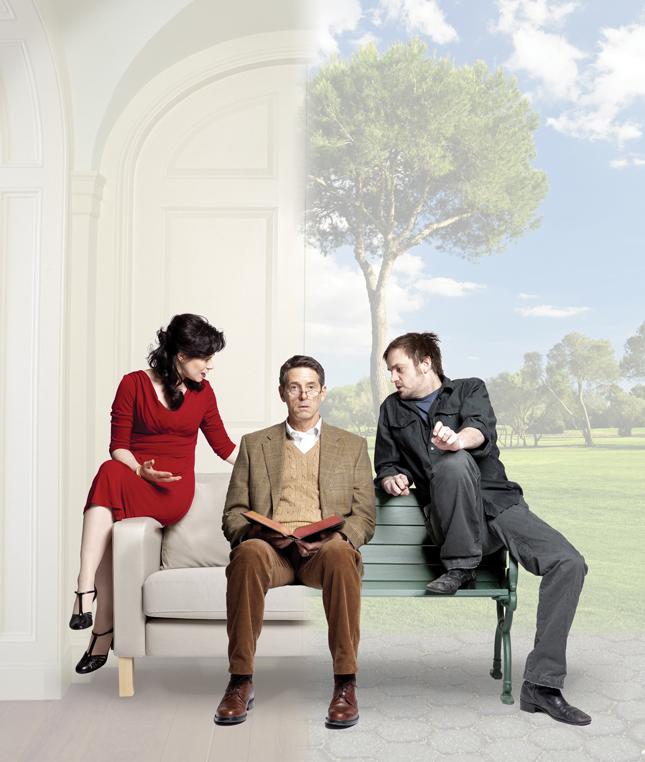Edward Albee & Tennessee Williams
By • July 26, 2011 0 2642

In the annals of 20th-Century American theater history, there are few playwrights more influential, more continually fascinating to theatergoers and theater makers, than Tennessee Williams and Edward Albee.
If there is a hierarchy of American playwrights, then Williams and Albee belong in the highest tier, along with Eugene O’Neill and Arthur Miller, for their strong, echoing and expansive bodies of work, an output that rarely dates in reading or performing, and continues to draw the attention of generations of theater artists.
Both playwrights are getting their full due in two ambitious, wide-reaching, far-flung local festivals. Arena stage will be hosting a two-month long Edward Albee festival. And “The Glass Menagerie Project” at Georgetown University, which runs through March 27 and picks up again in the summer, is part of a nationwide Tennessee Williams Centennial Festival.
There’s a vital, live-wire connection between the two festivals—“The Glass Menagerie Project” is part of an Arena Stage/Georgetown partnership and will be picked up again in June at the Arena Stage at the Mead Center for American Theater. And both festivals will be graced with the in-person presence of Albee.
The Arena Stage Edward Albee Festival kicks off with a visit from the Steppenwolf Theatre Company of Chicago and its electrifying production of Albee’s most produced and famous play, “Who’s Afraid of Virginia Woolf?” Starring Pulitzer Prize-winning playwright Tracy Letts as George and Amy Morton as Martha, it will be running in the Kreeger Theater February 25 – April 10.
Meanwhile and simultaneously, Arena Stage itself is mounting “At Home at the Zoo,” which will be performed in the Arlene and Robert Komodo Cradle February 25 — April 24.
That double bill would normally count as a mini-festival and ambitious project in itself. But wait, there’s more. Beginning in March and running through the end of April, 16 theater companies will present staged readings of Albee’s works. The readings, by such companies as the Shakespeare Theatre Company, Theater J, Taffety Punk, Round House Theatre, American Century Theater and Forum Theatre, with directors like Irene Lewis, Howard Shalwitz, Wendy C Goldberg and Amy Freed, are free, but reservations are required.
The readings will include “Lolita,” “Fragments,” “The Lady from Dubuque,” “Marriage Play,” “The Goat, or Who is Sylvia?” “The American Dream,” “Tiny Alice,” “The Play About the Baby,” “Three Tall Women,” “A Delicate Balance,” “Seascape,” and Albee’s version of Carson McCuller’s “The Ballad of the Sad Café.”
In addition, Albee will be honored with the presentation of the American Artist Award on March 14, in “An Evening with Edward Albee.”
Albee will also be present at Georgetown, appearing at Gaston Hall in a conversation with Susan Stamberg, a special correspondent for National Public Radio, talking about his perspectives on the work and influence of Tennessee Williams. The conversation will include performances from leading actors, curated by Albee himself. (March 24)
“The Glass Menagerie Project,” presented by the Georgetown Theater and Performance Studies Program, is a re-envisioning of what is generally considered Williams’ most autobiographical work, a work often called a “memory play.” The project—really a Williams festival—will include performances, discussions and events intended to illuminate Williams’ most familiar and perhaps least controversial play.
The project, of course, will feature a production of “The Glass Menagerie,” starring Georgetown theater professor and one of Washington’s most luminous, gifted actresses, Sarah Marshall as Amanda Wingfield. The show will be directed by Professor Derek Goldman and runs February 24 – March 27 at GU’s Davis Performing Arts Center’s Gonda Theater.
Other special productions and events include appearances by playwright Christopher Durang (who wrote “For Whom the Southern Bell Tolls,” a takeoff on “Menagerie”), and a performance of “Camino Real,” Williams’ most gaudy and mysterious play March 26. There will be readings, discussion, and plays throughout the festivals.
Among a trio of readings on March 26 is “Mister Paradise” directed by Joy Zinoman and featuring Ted Van Griethuysen.
Albee’s presence at both festivals should be electric, illuminating and haunting. Williams died in 1983, seemingly played out, but his plays continued to be performed everywhere, including as part of a notable Tennessee Williams festival at the Kennedy Center.
Albee and Williams both concerned themselves with aspects of that big theater theme, love—sexual, romantic and any otherwise. As such, many of their plays were considered controversial at the time of their debuts. “Who’s Afraid of Virginia Woolf?” with its plum, rich and profane language and sexual themes, had to be cleaned up a little for the movie version. Years later, “The Goat, or Who is Sylvia?” still had walkouts at its performance at Arena Stage because it was about…well, a man who loved a goat.
Williams’ later plays, like the classic “A Streetcar Named Desire,” “Sweet Bird of Youth” and “Cat on a Hot Tin Roof,” with its overt references to gay themes and violent incidents, were also controversial, while featuring grand roles for women, a Williams trademark.
Both of them continue to be influential writers and playwrights with their body of work, much of which will be celebrated in the two festivals. Go to ArenaStage.org for details on the Albee festivals and PerformingArts.Georgetown.edu for more on Williams.
- Edward Albee’s “At Home at the Zoo,” at Arena Stage. February 25 – April 24, 2011 | Scott Suchman



